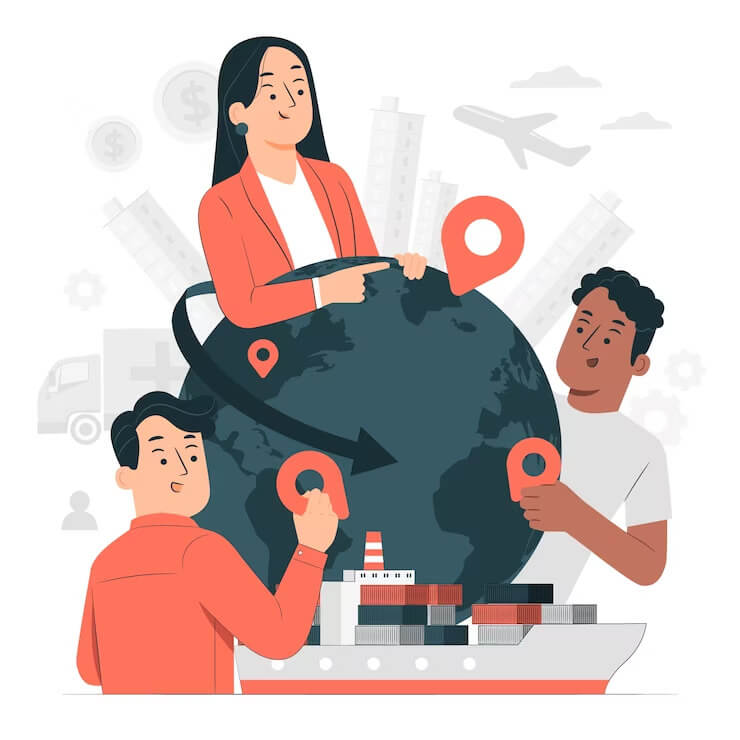Updated February 13, 2023
Globalization
Essay on Globalization refers to the integration of people, businesses, and governments. Most importantly, this integration occurs on a global scale. It is also the process of international business expansion. As a result of globalization, many businesses expand internationally and project a global image. As a result, the significant investment seems required to establish global companies. Globalization refers to integrating the Indian economy with the global economy. Although globalization has been occurring for the past 100 years, it has accelerated dramatically in the last 50. Product and service production and exchange have increased.
Globalization is the result of positive privatization and liberalization. It is primarily an economic process of connection and integration that is socially and culturally connected. It results from several policies to change the world and promote greater interconnectedness and integration. Essay on Globalization explains that it is a concept or strategy for interacting and uniting individuals, businesses, and governments on a global scale.
How did Globalization Emerge?
To begin with, people have traded goods since the dawn of civilization. Commodities were first transported from China to Europe in the first century BC. The Silk Road was a way to transport goods. The Silk Road stretched across a vast area. This has never happened before in the history of globalization.
Globalization has been spreading slowly since the first century BC. Another significant breakthrough occurred in the seventh century AD. During this period, the Islamic faith spread. Most notably, Arab traders aided in the rapid expansion of global trade. By the ninth century, Muslim traders controlled the majority of international trade. Furthermore, spices were an essential commodity in commerce at the time. The Age of Discovery in the 15th century marked the beginning of actual global trade. European traders connected the two continents, East and West. America is first discovered around this time. As a result, European trade reached America.
Beginning in the nineteenth century, the United Kingdom dominated every continent. As a result, global trade rapidly expanded in scope. In addition, the British built mighty railways and ships. As a result, transportation moved much faster. Furthermore, the rate of commodity manufacturing increased dramatically. Moreover, communication accelerated, which aided international trade. Finally, in the twentieth and twenty-first centuries, globalization reached its pinnacle. The internet and technology, in particular, advanced, significantly boosting globalization. As a result, e-commerce has a significant impact on globalization.
Advantages and Disadvantages of Globalization
As a result of studies, with the support of the World Bank and other international organizations, and with increased faith in the market economy and new policies focusing on private capital and resources, many developing countries have begun the structural adjustment process. Globalization has given developing countries more opportunities. Increased market access and technology transfer have the potential to improve their standards and productivity.
Globalization has enabled countries to gain access to a larger labor pool. If a developing country requires skilled labor, it can import it from another country. In contrast, outsourcing low-skill labor to developing countries with low living costs allows wealthier countries to lower the cost of goods sold and pass those savings on to consumers.
Since globalization, the Indian economy and standard of living have improved. An individual’s purchasing habits can change, especially if they work with international businesses. As a result, most cities have improved, with higher living standards and increased business growth.
The primary goal of commerce is to gain access to other countries’ resources. Smartphones, for example, could not be grown or manufactured if the transfer of resources between nations was not permitted.
At the same time, globalization has resulted in issues such as rising inequality between and within countries, financial instability, and deteriorating environmental conditions. As an intriguing display, globalization is also viewed as a global network of connectivity and competitiveness. Global firms and nations are now competing fiercely.
Consequences of Globalization
To begin with, foreign direct investment (FDI) is rapidly increasing. This is, without a doubt, a significant contribution to globalization. FDI contributes to industrial development. There is also an increase in the number of multinational corporations. Furthermore, FDI would benefit many third-world countries. Technological innovation is another vital contribution of globalization. The most notable aspect of globalization is its emphasis on technological advancement. Furthermore, globalization has resulted in the transfer of technologies. Technology would undoubtedly benefit the average person.
Globalization has improved product quality. This improvement is due to manufacturers’ efforts to produce high-quality products because of the stress of fierce rivalry. If the first product is of poor quality, people will quickly switch to another of higher quality.
Conclusion – Essay on Globalization
Essay on globalization is a reasonably obvious reality right now. What is most notable is that it continues to grow. Trading, above all, is a beautiful blessing because of its numerous positive economic and social consequences. Globalization has helped to provide jobs for a sizable portion of the population and provide a wide range of high-quality, reasonably priced goods and general economic benefits to emerging nations. However, it has also resulted in rivalry, crime, anti-national acts, terrorism, and other adverse outcomes. As a result, it has brought both delight and pain with it.

